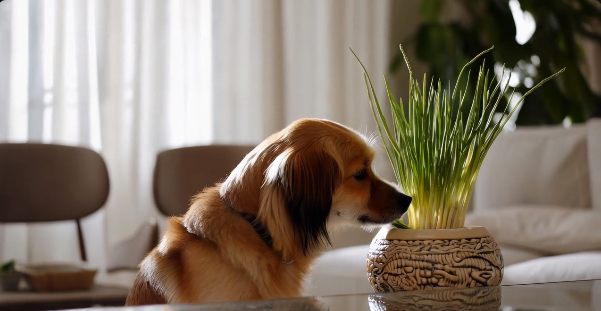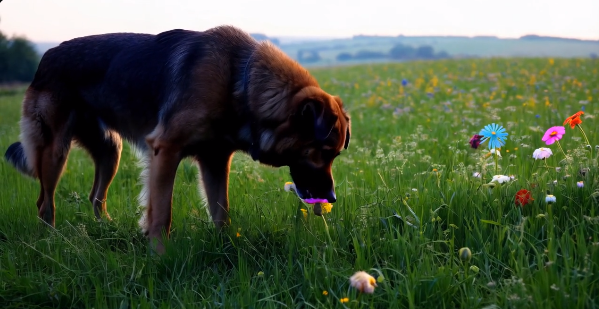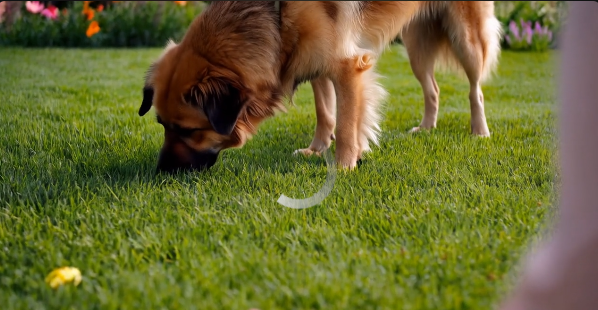If you’ve ever caught your dog munching on grass, it’s not the problem of a single pet lover or owner. Many dog owners wonder, Why is my dog eating lots of grass?
It’s a behavior that seems puzzling, and it’s one that often raises concerns. While this action can seem odd, it’s actually quite common.
For the most part, dogs eating grass isn’t a cause for alarm. In fact, it’s something most dogs do from time to time.
But if your dog is eating a lot of grass, or if it’s happening frequently, you might start to wonder if there’s a deeper reason behind it.
In this article, I am going to explore the various reasons why your dog might be eating grass. We’ll also look at when you should be concerned and what you can do about it.
Let’s jump and figure out why your dog might be chowing down on those grassy greens.

Normal Dog Behavior – Understanding Grass Eating
When asking, Why is my dog eating lots of grass? it’s important to know that grass-eating can be completely normal. For many dogs, it’s just part of their behavior.
In fact, some dogs eat grass regularly, and it doesn’t mean they’re sick or troubled.
Dogs, especially in the wild, may have instinctively eaten plants. This behavior could be a leftover trait from their ancestors.
Wild canines would sometimes eat grass to help with digestion or simply out of curiosity.
In healthy dogs, eating grass occasionally is usually nothing to worry about. If your dog is eating grass but seems happy, active, and healthy, it’s probably just part of their routine.
However, if it becomes a frequent habit or your dog shows other signs of distress, it’s a good idea to keep an eye on them.
Possible Reasons Why Your Dog Is Eating Lots of Grass
When you wonder, Why is my dog eating lots of grass? there could be several reasons behind this behavior. Let’s take a closer look at some of the most common explanations.
1. Nutritional Deficiency
One possible reason your dog is eating lots of grass is that they may have a nutritional deficiency.
Dogs, especially those on an unbalanced diet, might seek out plants to make up for missing nutrients. For example, a lack of fiber, vitamins, or minerals could lead your dog to munch on grass.
If your dog is eating grass in large quantities, it might be their way of getting extra nutrients that they’re not getting from their food.
2. Digestive Issues
Another common reason for grass-eating is digestive discomfort. If your dog feels nauseous or has an upset stomach, they might turn to grass to help induce vomiting.
Some dogs eat grass to clear their system of something they ate or to ease discomfort. If your dog eats grass and then vomits afterward, it could be their way of self-medicating.
3. Boredom or Anxiety
Sometimes, when you ask Why is my dog eating lots of grass? the answer may be simpler: they are bored or anxious. Dogs need mental and physical stimulation.
If they’re not getting enough exercise, attention, or playtime, they might turn to grass as a way to pass the time.
Dogs that are stressed or anxious might also chew on grass to cope with their feelings. If this seems to be the case, you might notice your dog eating grass when you’re not around or during times of routine changes.
4. Instinct or Curiosity
Some dogs eat grass simply because they enjoy it or because it’s part of their natural curiosity. Young dogs, especially puppies, are more likely to nibble on grass as they explore the world around them.
It could be that your dog just finds the taste or texture of grass interesting. This is especially true if your dog eats grass without showing signs of illness afterward.
5. Self-Medication for Parasites
Although less common, some dogs eat grass to help deal with gastrointestinal parasites. If your dog has intestinal worms or other parasites, they might eat grass to try to relieve discomfort.
The grass could help induce vomiting or clear out any irritants in their stomach. If you notice your dog eating lots of grass and also showing signs like weight loss, diarrhea, or bloating, it’s a good idea to consult your vet for a fecal exam.
Each of these reasons can answer Why is my dog eating lots of grass? Understanding the cause can help you decide whether this behavior is harmless or if it’s time to take action.

When Should You Be Concerned About Grass Eating?
If you’re wondering, Why is my dog eating lots of grass? it’s important to know when this behavior might be a sign of something more serious.
In most cases, grass-eating isn’t harmful, but there are times when you should be concerned.
1. Excessive Vomiting or Diarrhea
If your dog eats lots of grass and then vomits frequently or experiences diarrhea, it could be a sign of an underlying health issue.
While some dogs eat grass to induce vomiting in order to relieve digestive discomfort, frequent vomiting or diarrhea is not normal. If this happens regularly, it’s time to consult your vet.
2. Change in Behavior or Appetite
If your dog starts eating grass more than usual or shows signs of lethargy, loss of appetite, or changes in behavior, there might be a health concern.
A sudden increase in grass-eating could indicate discomfort or a nutritional imbalance. If your dog seems unusually tired or disinterested in their food, it’s worth getting them checked by a vet.
3. Weight Loss or Bloated Abdomen
If your dog is eating lots of grass and also showing signs like weight loss, a bloated belly, or changes in their stool, it could be a sign of gastrointestinal issues or parasites.
Conditions like worms or infections can cause these symptoms, and eating grass might be their way of coping. It’s important to have your dog examined by a veterinarian if you notice these signs.
4. Persistent Grass Eating Without Other Symptoms
If your dog is eating lots of grass but doesn’t show any other signs of illness, it’s likely not a cause for concern.
However, if the behavior becomes persistent or more frequent, a vet visit is recommended to rule out potential health problems or to ensure your dog’s diet is meeting their nutritional needs.
Knowing when to seek professional help is key to understanding why is my dog eating lots of grass and ensuring their health isn’t at risk. If in doubt, always consult with a vet to get the best advice.

How to Address Your Dog’s Grass Eating Habit
If you’re asking yourself, Why is my dog eating lots of grass? and you’ve ruled out any serious health issues, there are steps you can take to manage or reduce the behavior. Here’s what you can do to help:
1. Ensure a Balanced Diet
One reason your dog might be eating lots of grass is a nutritional deficiency. To address this, make sure your dog is getting a balanced diet with all the necessary nutrients.
High-quality dog food that contains the right amount of protein, fiber, and vitamins can help curb the need for grass.
If you’re unsure about your dog’s diet, ask your vet for recommendations on food or supplements.
2. Increase Exercise and Mental Stimulation
Boredom or anxiety could be driving your dog’s grass-eating habit. If your dog is not getting enough exercise or mental stimulation, they might turn to grass as a way to cope.
Increase daily walks, playtime, and interactive toys to keep them engaged. You can also try puzzle feeders or training exercises to challenge your dog mentally.
The more active and busy your dog is, the less likely they are to seek out grass as entertainment.
3. Manage Anxiety and Stress
If your dog’s grass-eating seems linked to anxiety or stress, there are several ways to help them feel calmer.
Create a consistent routine with regular feeding, exercise, and playtime. Consider using calming products, like anxiety wraps or pheromone diffusers.
If your dog’s stress is severe, talk to your vet about behavioral therapy or other treatment options.
4. Regular Vet Checkups
If your dog continues to eat lots of grass despite a balanced diet and plenty of exercise, it’s important to rule out any medical conditions. Regular vet visits are essential for monitoring your dog’s health. Your vet can check for digestive issues, parasites, or any other underlying conditions that might be causing the behavior.
A simple fecal exam can rule out gastrointestinal parasites, which can sometimes prompt dogs to eat grass.
5. Provide Safe, Dog-Friendly Grass
If your dog’s grass-eating is more about curiosity or enjoyment, consider providing them with dog-safe grass or herbs to munch on.
You can find pet-safe grass kits at pet stores, or even grow your own in a small container. This way, your dog can satisfy their natural craving without eating potentially harmful plants from your yard.
Taking these steps can help address why your dog is eating lots of grass and provide your dog with the best care possible.
Understanding the root cause of the behavior is the first step in finding a solution. If you ever feel unsure, don’t hesitate to consult your vet for personalized advice.
Conclusion
So, why is my dog eating lots of grass? While this behavior can be puzzling, it’s often harmless. In most cases, dogs eat grass for a variety of reasons, from nutritional needs to boredom or simply curiosity.
As long as your dog is otherwise healthy and not showing signs of distress, occasional grass-eating is usually nothing to worry about.
However, if your dog’s grass-eating becomes excessive, or if you notice symptoms like vomiting, diarrhea, or weight loss, it’s important to investigate further.
By ensuring your dog has a balanced diet, enough exercise, and regular vet checkups, you can address the root cause of the behavior.
If your dog seems to be eating grass for comfort or enjoyment, providing safe, dog-friendly grass or herbs might be a simple solution. Remember, every dog is different.
If you’re ever unsure about why your dog is eating lots of grass, don’t hesitate to consult your vet for advice tailored to your dog’s needs.
Understanding your dog’s behavior is key to ensuring their well-being and helping them stay happy and healthy.
Related posts:
How to stop your dog pooping at night“
Can dogs get sick from eating cat food
FAQs
1. Is it normal for dogs to eat grass?
Yes, it’s quite common for dogs to eat grass. Most of the time, it’s harmless and just part of their natural behavior.
2. Why is my dog eating grass and vomiting?
Dogs sometimes eat grass to induce vomiting when they have an upset stomach or need to expel something they’ve eaten.
3. Can grass be harmful to my dog?
Generally, grass is safe for dogs to eat, but it can cause gastrointestinal upset if ingested in large amounts or if it’s contaminated with pesticides.
4. Should I be concerned if my dog eats grass every day?
If your dog eats grass daily but remains healthy, it’s likely not a concern. However, frequent vomiting or changes in behavior may require a vet visit.
5. Does eating grass indicate a nutritional deficiency in dogs?
Yes, some dogs eat grass to compensate for missing nutrients, such as fiber or minerals, in their regular diet.
6. How can I stop my dog from eating grass?
To reduce grass-eating, ensure your dog gets a balanced diet, more exercise, and mental stimulation to keep them engaged.
7. Can anxiety make my dog eat grass?
Yes, stress or anxiety can lead some dogs to eat grass as a coping mechanism, especially if they are bored or left alone for long periods.
8. Why does my puppy eat so much grass?
Puppies often eat grass out of curiosity as part of exploring their environment. It’s usually not harmful unless accompanied by signs of illness.
9. Is my dog eating grass because of worms or parasites?
While less common, some dogs eat grass to help clear out parasites or soothe digestive discomfort caused by worms.
Can I give my dog grass to eat if they seem to like it?
You can offer dog-safe grass grown for pets, but avoid wild grass, as it might contain harmful chemicals or pests. Always supervise their grass-eating.


Pingback: Can Puppies Eat Pizza Crust? What You Need to Know - Tech Promot